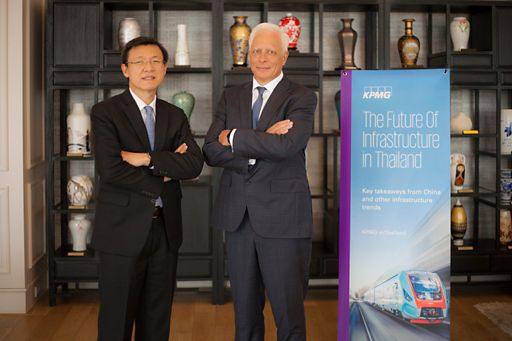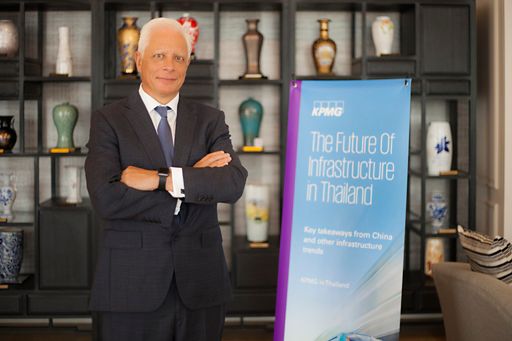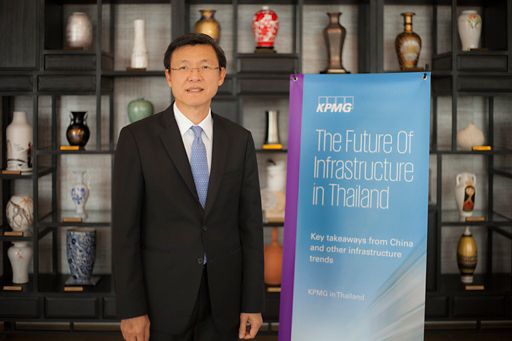KPMG advises key takeaways from China’s Belt and Road initiatives that can be applied to Thailand
KPMG advises key takeaways from China’s BRI
KPMG in Thailand hosted a seminar on ‘The Future of Infrastructure in Thailand’ at KPMG Lounge on 23 May 2018.

Bangkok, 23 May 2018 – KPMG in Thailand hosted a seminar on ‘The Future of Infrastructure in Thailand’ at KPMG Lounge on 23 May 2018. The seminar was held with the objective to pinpoint significant opportunities and lessons learned from China and other global infrastructure trends, and how these can be adapted to Thailand as the country embarks on large-scale infrastructure projects, such as the Eastern Economic Corridor (EEC). The key speakers were Julian Vella, ASPAC Head of Global Infrastructure, KPMG International, and Tanate Kasemsarn, Partner and Head of Infrastructure, Government, Healthcare and Hotel, KPMG in Thailand.
KPMG International’s Emerging Trends in Infrastructure identifies a number of key trends shaping today’s infrastructure sector. These range from the challenge of sustaining public spaces and infrastructure security, to infrastructure projects with flexibility for the future, the value of big data in infrastructure and sustainability in all aspects. Also, the report cautions that today’s divisive politics may result in many worthy projects becoming stalled under the weight of political and social indecision. However, we are also seeing huge-scale regional infrastructure projects taking place as governments in the East are recognizing that greater regional and international connectivity can lead to faster growth, more stable economic development and improved living standards.
Likewise, infrastructure has played an important role in China’s rapid development, with infrastructure projects aimed at creating connectivity with other countries. The Belt and Road initiative (BRI), a Chinese strategic infrastructure initiative announced by President Xi Jinping in 2013, conceptually envisages a path by land from China through Central Asia to Europe, with the maritime route flowing through Southeast Asia, the Indian Ocean, the Middle East, and Africa to Southern Europe. The initiative aims to enhance commerce and spread prosperity across 60-plus countries with a combined population well in excess of 4 billion.

Julian Vella, ASPAC Head of Global Infrastructure, KPMG International
“The BRI is a major undertaking that will span several decades. We can expect to see significant infrastructure development in China and throughout the BRI, which will in turn catalyze trade and economic growth within China, and also across Asia and beyond,” says Julian Vella, ASPAC Head of Global Infrastructure, KPMG International.
“More than just learning from the benefits of geographic connectivity in infrastructure, China’s recent successes also triggers the conversation on other relevant aspects important to Thailand’s infrastructure and ongoing economic development,” Vella adds. These include topics such as developing a shared vision, curating a policy dialogue, mitigating political and regulatory risks, committing to sustainability, and of course, fostering innovation.1
Earlier this year, Thailand approved the action plan to develop infrastructure projects with a total budget of approximately THB1.6 trillion, which will be undertaken to facilitate the development of the Eastern Economic Corridor (EEC). These infrastructure projects are to seamlessly develop intermodal logistics connectivity in the EEC region and the Road and Belt Initiative, as well as to ease the overcrowding problems in Bangkok with a high-speed railway system from Bangkok to EEC, and the air-traffic congestion of Don Muang and Suvarnabhumi international airports with U-Tapao international airport as the third major airport in Thailand.2
Apart from U-Tapao International airport, high-speed rail connecting three international airports, Map Ta Phut Industrial Port Phase III, Laem Chabang Port Phase III, The U-Tapao Maintenance, Repair and Overhaul Centre (MRO) and The Digital Industry and Innovation Promotion Zone (Digital Park Thailand) are approved infrastructure projects under EEC to help create better interconnectivity and boost economic growth within Thailand and in the region.

Tanate Kasemsarn, Head of Infrastructure, Government, Healthcare and Hotel, KPMG Thailand
“The EEC project will definitely create significant investments in infrastructure, industrial projects, and social projects, which will in turn strengthen the economic, GDP growth and social development of not only Thailand, but also other countries through interconnectivity,” says Tanate Kasemsarn, Partner and Head of Infrastructure, Government, Healthcare and Hotel, KPMG in Thailand. “With unmatched opportunities and benefits provided by the Thai government, it is an interesting opportunity for businesses, whether through direct investments or investing and participation in a public-private partnership scheme.”
Thai version: เคพีเอ็มจี เผยกรณีศึกษาจากยุทธศาสตร์ Belt and Road Initiative ในประเทศจีนที่สามารถนำมาปรับใช้ได้กับประเทศไทย
About KPMG International
KPMG is a global network of professional services firms providing Audit, Tax and Advisory services. We operate in 154 countries and territories and have 200,000 people working in member firms around the world. The independent member firms of the KPMG network are affiliated with KPMG International Cooperative ("KPMG International"), a Swiss entity. Each KPMG firm is a legally distinct and separate entity and describes itself as such.
About KPMG in Thailand
KPMG in Thailand, with more than 1,700 professionals offering audit, tax, and advisory services, is a member firm of the KPMG network of independent firms affiliated with KPMG International Cooperative (“KPMG International”), a Swiss entity.
For media enquiries, please contact:
Ploi Phayakvichien
Tel: 02 677 2034
ploi@kpmg.co.th
Praewpan Luangphaipol
Tel: 02 677 2141
praewpan@kpmg.co.th
1World Economic Forum, “The New Silk Road: 8 steps to ensuring China’s $900 billion project is a success,” World Economic Forum, https://medium.com/world-economic-forum/the-new-silk-road-8-steps-to-ensuring-chinas-900-billion-project-is-a-success-d2415ac7c7f3 (accessed May 17, 2018).
2EEC : Eastern Economic Corridor, “The Eastern Economic Corridor Policy Committee Meeting NO.1/2018,” EEC : Eastern Economic Corridor https://www.eeco.or.th/en/pr/news/eastern-economic-corridor-policy-committee-meeting-no12018 (accessed May 17, 2018).
Some or all of the services described herein may not be permissible for KPMG audit clients and their affiliates or related entities.
© 2024 KPMG Phoomchai Holdings Co., Ltd., a Thai limited liability company and a member firm of the KPMG global organization of independent member firms affiliated with KPMG International Limited, a private English company limited by guarantee. All rights reserved.
For more detail about the structure of the KPMG global organization please visit https://kpmg.com/governance.